STEAMKitchen
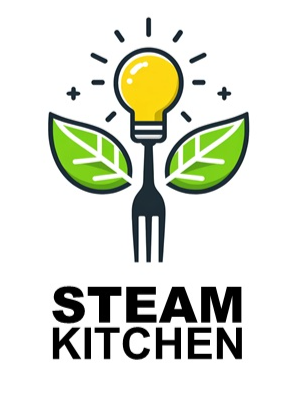
About the project
The project period is March 2024 - February 2026.
It is a Erasmus+ KA220-HED project, code 2023-1-EE01-KA220-HED-000159885
- STEAMKitchen - Bridging STEAM practices and home economics in teacher education. Information about the project in the Estonian Research Information System - ETIS: https://www.etis.ee/Portal/Projects/Display/42788872-cefc-4436-9c53-538387f192e2
- Coordinator: Kristi Paas, lecturer of Home Economics theory and didactics, School of Natural Sciences and Health, Tallinn University
- Project Team in Tallinn University: Jaana Taar, Kristi Paas, Tiina Vänt, Katrin Männik and Matti Juhani Rossi
_38.png)
STEAMkitchen project aims to contribute to the transformation of the educational practices in higher education, to provide teacher educators as well as preservice teachers concrete instruments and experiences for implementing STEAM principles into home economics learning practices with a focus on sustainability issues. The project aims to promote women's and girls’ interest in STEAM through interdisciplinary teaching in a home economics context. It is predicted that applying STEAM principles in home economics education brings girls closer to scientific and technological specialties and at the same time also broadens boys' understanding of implementing STEAM-related knowledge into everyday activities.
The STEAMkitchen project has three interdependent outputs: guidelines, a handbook, and an e-course that can be connected to teacher training programs of partner universities and implemented in schools in other EU countries. The created tools alone do not guarantee changes, therefore, as a result of this project, different parties become aware of the content and results of the STEAMkitchen project and thereby gain knowledge about planning interdisciplinary teaching and implementing STEAM learning in different classes, enabling students to integrate these principles in sustainable everyday life situations.
Project Partners
Universities from four countries participate in the STEAMKitchen project:
- Tallinn University, School of Natural Sciences and Health from Estonia has the role of the coordinator in this project
- University of Helsinki, Faculty of Educational Sciences from Finland
- University of Stavanger from Norway
- Johannes Kepler University Linz from Austria
Universities from four countries participate in the STEAMKitchen project:
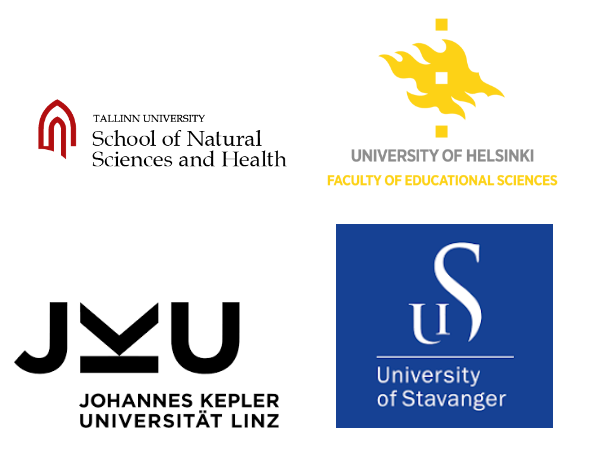
Project Activities
18.-20.03.2024 Kick-off meeting in Linz, Austria.The first joint meeting of the project partners: getting to know the project members and discussing the project's activities and results.
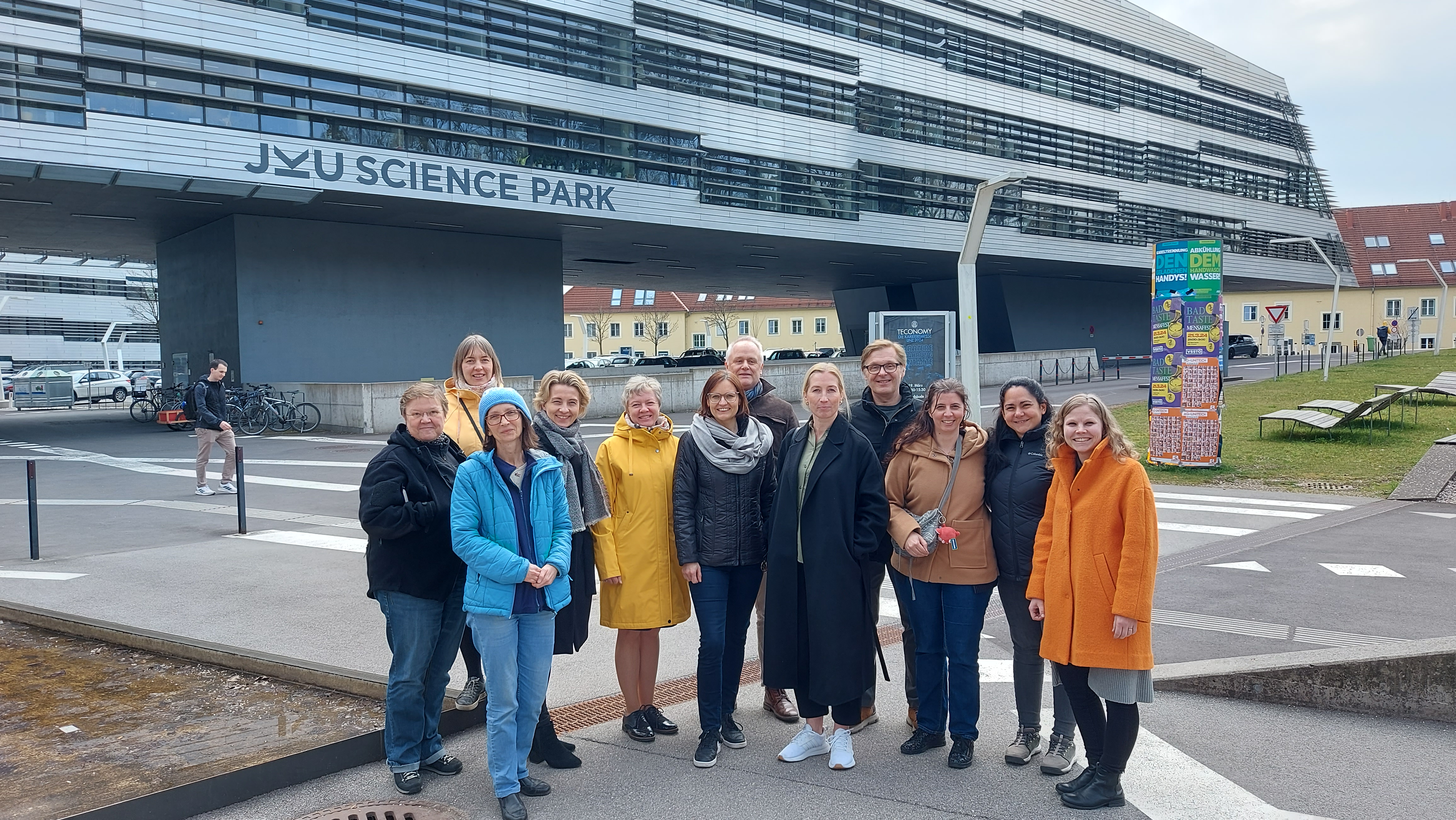
Implementation of work package (WP) activities
WP 2 (01.04.2024–31.01.2025): Guidelines. From April to the end of October 2024, regular joint online discussions were held between project partners. The aim of these discussions was to collaboratively develop a draft of the guidelines, focusing on the effective integration of Home Economics and STEAM (Science, Technology, Engineering, Arts, and Mathematics) principles. The thematic areas were divided among the partners based on their expertise, ensuring that each country’s specific features related to Home Economics in the curriculum and STEAM education were represented.
During the monthly meetings, ideas were shared, and different approaches were discussed. By the end of summer, partners had agreed on the final structure and content of the guidelines. In September, a draft version was prepared, which was then reviewed by various focus groups (teachers, teacher educators, and policymakers) in October and November to gather feedback on the content and format. The feedback was largely positive, highlighting the value of integrating STEAM and Home Economics. The suggestions gathered were taken into account when preparing the final version, which was completed in December 2024. After that, translation into the partner countries’ languages began, and the text was adapted to fit the local context and terminology to ensure usability in each participating country. By January 2025, the guidelines were available in Estonian, Finnish, German, and Norwegian. Subsequently, a designer began work on creating a visually appealing final version of the text.
The completed guidelines are available for download here:
Integrating Home Economics and STEAM: A Guide to Interdisciplinary Learning for Sustainability
Kotitalous ja STEAM: lähtökohtia kestävän kehityksen monitieteiseen oppimiseen
Ernährung und Haushalt mit MINKT: Eine Leitfaden für nachhaltiges, interdisziplinäres Lernen
Integrering av Mat og helse og STEAM: En guide til tverrfaglig læring for bærekraft
TP 3 (01.10.2024 - 28.02.2026): Handbook. The collection of ideas for the content of the handbook started in parallel with the development of the guidelines. The main action plan and the oversight of the task template were key points during the partner meeting held in Helsinki on October 7-8, where the next steps were agreed upon and the key stages of work were defined. During the meeting, various concepts were discussed, and a shared vision of the structure of the tasks was reached.
_26.png)
Photo: meeting of representatives of project partners in Helsinki
Since November 2024, the joint online discussions within WP3 have focused on the creation and development of learning activities among project partners.This process has involved several stages, beginning with idea generation and topic mapping. Each activity was linked to specific elements of Home Economics and STEAM to ensure alignment with curricula and the project's objectives. A unified template structure was then developed as the basis for compiling the learning activities. The activity descriptions were continuously reviewed and commented on by partners. Based on the feedback received, the descriptions were refined and harmonized to ensure clarity and applicability across all partner countries.
A total of 20 learning activities have been compiled into the handbook. These activities will be piloted with different target groups in spring and autumn 2025. Feedback collected during the piloting phase will be used to improve the final descriptions of the learning activities.
STEAM and Home Economics in Practice: Piloting Learning Activities
In March, home economics teacher students from the University of Helsinki, in collaboration with the STEAMKitchen project, organized two workshops related to combining STEAM and Home economics education for the members of the Finnish Home Economics Teachers' Association.
The workshops aimed to demonstrate for the members of the Finnish Home Economics Teachers' Association how STEAM education can be meaningfully integrated into home economics through practical learning activities. Participants had the opportunity to test two classroom-ready experiments designed within the STEAMKitchen project.
In the first activity, participants created a natural pH indicator using red cabbage and explored how it reacts with common household substances. In the second, they explored the various uses of vinegar in everyday life, while also considering how it could be used as a tool to guide students in reducing the chemical load in the home environment.
The workshops offered both inspiration and practical tools for incorporating interdisciplinary and sustainability-focused content into home economics teaching. Feedback from participants was highly positive, and the sessions clearly sparked further interest in STEAM topics within the home economics teacher community.
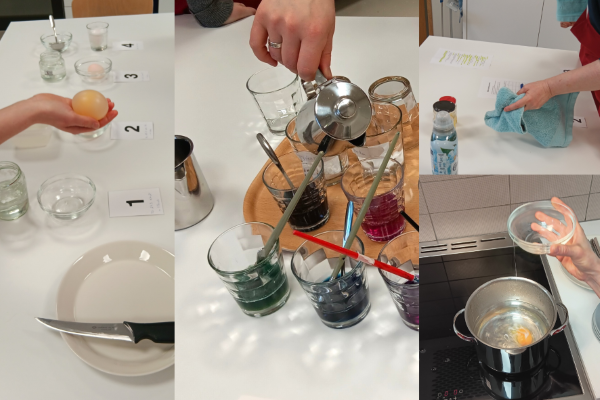
WP 4 (01.02.2025 - 28.02.2026) – Developing of an e-course. WP4 began in February 2025. The final work package focuses on promoting a modern and professional learning environment in partner universities by supporting the integration of best practices and innovative methods into teacher education. The course will be incorporated into teacher education curricula, enabling its use in the training of future teachers.
Partners from three universities – Tallinn University, the University of Helsinki, and Johannes Kepler University – are involved in developing the course modules.
Piloting of the e-course is planned for autumn 2025.
Project Meeting in Tallinn
To review the overall progress of the project, assess the development of work packages, and agree on the next joint activities, representatives from the partner universities met for a project meeting at Tallinn University.
While virtual meetings allow for regular communication and efficient coordination, face-to-face meetings play an important role in building trust, deepening collaboration, and fostering a shared understanding among project partners.
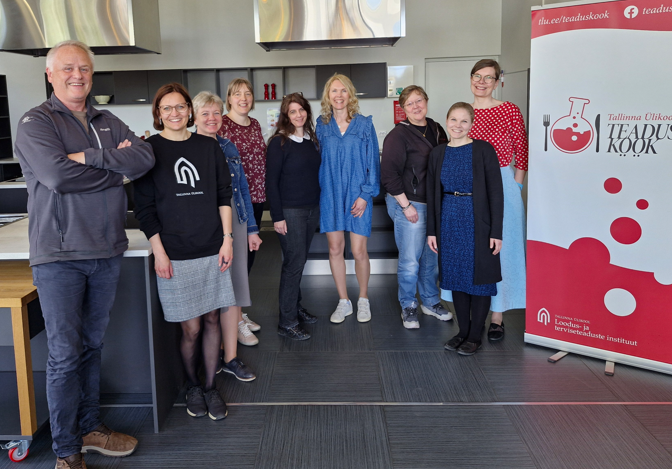
Project Outcomes
Integrating Home Economics and STEAM: A Guide to Interdisciplinary Learning for Sustainability
Kotitalous ja STEAM: lähtökohtia kestävän kehityksen monitieteiseen oppimiseen
Ernährung und Haushalt mit MINKT: Eine Leitfaden für nachhaltiges, interdisziplinäres Lernen
Integrering av Mat og helse og STEAM: En guide til tverrfaglig læring for bærekraft